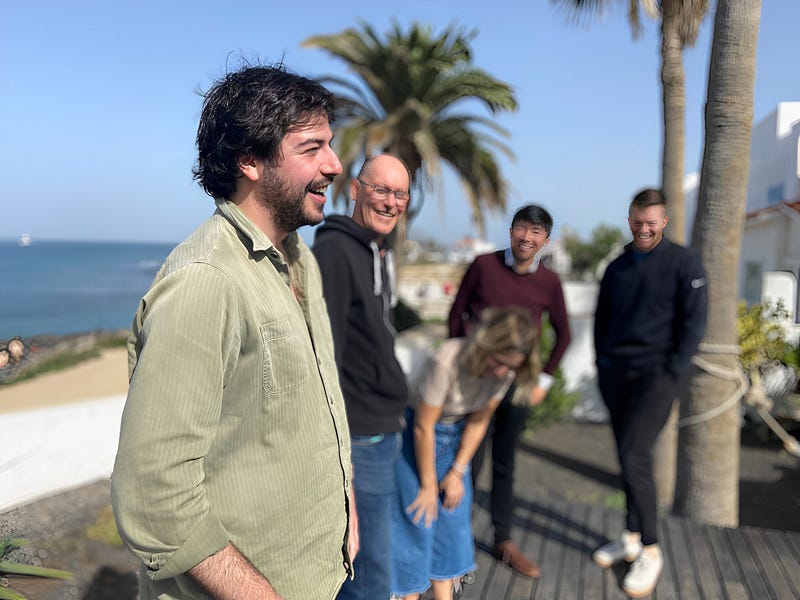Measuring wellness without surveys: Because surveys are limited and AI offers us a new, effortless way to measure wellbeing without having to bother employees with yet another poll.
The pandemic pause brought us to a moment of collective reckoning about what it means to live well and to work well. As a result, employees are sending employers an urgent signal that they are no longer willing to choose one — life or work — at the cost of the other. Working from home brought life literally into our work. And as the world now goes hybrid, employees are drawing firmer boundaries about how much of their work comes into their life. Where does this leave employers? And which perspectives and programs contribute most to progress? In our newest interview series, Working Well: How Companies Are Creating Cultures That Support & Sustain Mental, Emotional, Social, Physical & Financial Wellness, we are talking to successful executives, entrepreneurs, managers, leaders, and thought leaders across all industries to share ideas about how to shift company cultures in light of this new expectation. We’re discovering strategies and steps employers and employees can take together to live well and to work well.
As a part of this series, we had the pleasure of interviewing Alejandro M. Agenjo.
Alejandro is a Madrid-born engineer, psychologist, and entrepreneur whose passion is understanding people and improving communities and their systems. He was named one of the top social entrepreneurs in 2019 for his ed-tech startup seeking to detect students’ strengths and learning styles to improve learning and future opportunities. Today, he’s the proud co-founder and CEO of Erudit, an AI SaaS empowering executives with real-time workforce insights to build healthier work communities.
Thank you for making time to visit with us about the topic of our time. Our readers would like to get to know you better. Tell us about a formative experience that prompted you to change your relationship with work and how work shows up in your life.
Thank you for giving me the opportunity to share my experience. I have a background in psychology and engineering and when I first started working in education, I wanted to focus on the strengths of students rather than their weaknesses. As I entered the tech space I noticed that organizations needed to work harder to ensure employees feel heard and understood. This was especially noticeable during the pandemic, when mental illness and feelings of burnout started to become more common.
My friend Rick and I decided to take action and use his expertise in AI to empower empathy and understanding among leaders in organizations. Emotional intelligence is an essential tool for creating a positive and productive environment, and we strive to help employers build a culture that is supportive, respectful and understanding of the unique needs of their employees.
Harvard Business Review predicts that wellness will become the newest metric employers will use to analyze and to assess their employees’ mental, physical and financial health. How does your organization define wellness, and how does your organization measure wellness?
I agree that there is a gap in understanding and measuring wellbeing, which is a shame because it is such an important metric to track as organizations attempt to create workspaces where people are excited, happy, and fulfilled. We hope to fill this gap by providing people leaders with easy-access to three important wellness metrics: employee engagement, burnout risk, and turnover risk. Erudit also measures employee sentiment on other dimensions that impact wellbeing, such as autonomy at work, alignment with leadership, organizational support, peer relationships, physical environment, professional growth, reward and recognition, workload coping, and overall satisfaction.
Effortless access to these metrics everyday can help organizations reduce stress and improve overall wellbeing. The goal is to be an organization where employees are happy and excited to work everyday.
Based on your experience or research, how do you correlate and quantify the impact of a well workforce on your organization’s productivity and profitability?
A well-trained and well-motivated workforce has a measurable, positive impact on any organization’s profitability and productivity. A skilled and motivated workforce can help an organization reach its goals more quickly and efficiently, which ultimately impacts the bottom line.
But we go back to the dilemma of measuring wellness and wellbeing. Regularly assessing staff wellbeing is essential for understanding the relationship between wellbeing, productivity, and profitability. Traditional engagement surveys are conducted annually or, at most, quarterly. However, with Erudit, we can gain a daily insight into wellbeing, allowing us to observe how certain events or situations within an organization can affect a team’s wellbeing on a daily basis. We are eager to explore this further and gain more insights with our clients.
Even though most leaders have good intentions when it comes to employee wellness, programs that require funding are beholden to business cases like any other initiative. The World Health Organization estimates for every $1 invested into treatment for common mental health disorders, there is a return of $4 in improved health and productivity. That sounds like a great ROI. And, yet many employers struggle to fund wellness programs that seem to come “at the cost of the business.” What advice do you have to offer to other organizations and leaders who feel stuck between intention and impact?
Voluntary turnover can cost a company up to 2 times the employee’s salary. Add to that the time and effort it takes to onboard and train a new hire and the effect of quits on other members of the team, it makes good business sense to invest in your people and their growth. The reality is, employees are a business’s greatest asset. These days, employees are more aware of what they need to thrive in their careers and they’re willing to leave companies in search of it. So listening to them and caring for them should be a top priority!
Speaking of money matters, a recent Gallup study reveals employees of all generations rank well-being as one of their top three employer search criteria. How are you incorporating wellness programs into your talent recruitment and hiring processes?
We’re looking at wellness from all angles: Mental, Emotional, Social, Physical, and Financial. Our employees have private health insurance that covers psychologist appointments and treatments, apart from access to a wellness platform that offers access to a wide variety of sports facilities across the world. We also organize several team-building events during the year where we all get together to work and to create memories and a sense of belonging. These work trips have helped form a strong bond within the team and helps attract new hires through our current pool of remarkable talent.
We’ve all heard of the four-day work week, unlimited PTO, mental health days, and on-demand mental health services. What innovative new programs and pilots are you launching to address employee wellness? And, what are you discovering? We would benefit from an example in each of these areas.
We’re a startup that loves learning and improving! We’re growing both in volume of employees and in initiatives to ensure their wellbeing. I’ve mentioned private health insurance, gym memberships, and regular work trips. We also have monthly one-to-ones between individual contributors and managers to discuss what they need and how they are doing. We’re using the agile methodology to align on objectives and the tasks to be done toward those objectives by each member, considering we’re all working remotely. These tasks are measurable and clearly defined, which has proven to be incredibly helpful in reducing stress and increasing autonomy. Of course, we use Erudit to track the wellness of each team and we’re given all employees access to the platform so they can check how their own department is doing in terms of engagement, burnout risk, and turnover risk. When they see burnout risk increasing or engagement dropping, they even take it upon themselves to offer help and support to colleagues.
Can you please tell us more about a couple of specific ways workplaces would benefit from investing in your ideas above to improve employee wellness?
Each workforce and each team is different. For example, our marketing team and our product development team have varying levels of engagement and burnout depending on what they’re going through. It’s interesting to see and it helps foster understanding. It empowers leaders to adjust to the needs of their team. There is no one-size-fits-all solution to wellness. We want to invite organizations to try Erudit and see for themselves the patterns and of their company’s wellbeing so they can design initiatives that work for them.
How are you reskilling leaders in your organization to support a “Work Well” culture?
We encourage leaders to improve their communication, collaboration, and decision-making skills. We stress the importance of self-care, stress management, and mindfulness. But the most concrete way we reskill leaders is to provide opportunities for them to gain feedback. Understand, and track the improvement of their team’s wellbeing through Erudit.
Ideas take time to implement. What is one small step every individual, team, or organization can take to get started on these ideas — to get well?
We’ve launched several webinars with organizational psychologists and HR pros and what constantly surfaces in discussions is the importance of communication, transparency, and trust. A concrete way to foster this culture is to simply communicate expectations clearly and be open about receiving and giving feedback in a kind and constructive manner.

What are your “Top 5 Trends To Track In the Future of Workplace Wellness?”
An emphasis on trust: As we moved to remote working, many organizations found it difficult to trust that their employees will do the same amount of work. Now we’ve seen that people go the extra mile to deliver, maybe even moreso when working from home. I think trust should strengthen in the workplace. Organizations without trust will fall behind.
Flexibility: Every employee is unique but I’ll be bold and say that every employee values flexibility and the freedom to adjust to their own unique needs and work style. Do you prefer remote, in-office, or hybrid? We should give employees the power to decide what works best for them.
Empathy in leaders: This should be a requirement for any leader.
Measuring wellness without surveys: Because surveys are limited and AI offers us a new, effortless way to measure wellbeing without having to bother employees with yet another poll.
AI that empowers empathy: With more and more data, AI will help provide insights that encourage leaders to better understand and empathize with their teams.
What is your greatest source of optimism about the future of workplace wellness?
The Great Revelation and the rise of AI are my sources of optimism.
The belief that employees are expendable and easily replaceable is a mindset that no longer serves the modern workplace, or employees. Companies are now making a conscious effort to prioritize employee wellbeing and create an environment where employees thrive. This is a shift from the Great Resignation to a Great Revelation, where people understand what they need to grow and organizations answer the call to support them. This could lead to a workplace where wellness is no longer seen as a nice-to-have, but rather an essential part of creating a sustainable and successful business. Through the use of AI-powered tools, companies can create a workplace culture that not only supports the physical and mental wellbeing of employees, but also provides the resources and guidance they need to reach their full potential.
Our readers often like to continue the conversation with our featured interviewees. How can they best connect with you and stay current on what you’re discovering?
They can follow me on Linkedin and Twitter, and they can also follow Erudit for more insights on leadership and work culture.
Thank you for sharing your insights and predictions. We appreciate the gift of your time and wish you continued success and wellness.


